Key takeaways:
- Automation enhances creative focus for independent labels by handling administrative tasks like distribution and royalty tracking.
- Key benefits include improved data analysis for targeted marketing and scalability during roster expansion.
- AI-driven tools and automated content creation are emerging trends that personalize music discovery and streamline social media presence.
- Challenges include balancing automation with personal touch, integrating new tools, and budget constraints for implementation.
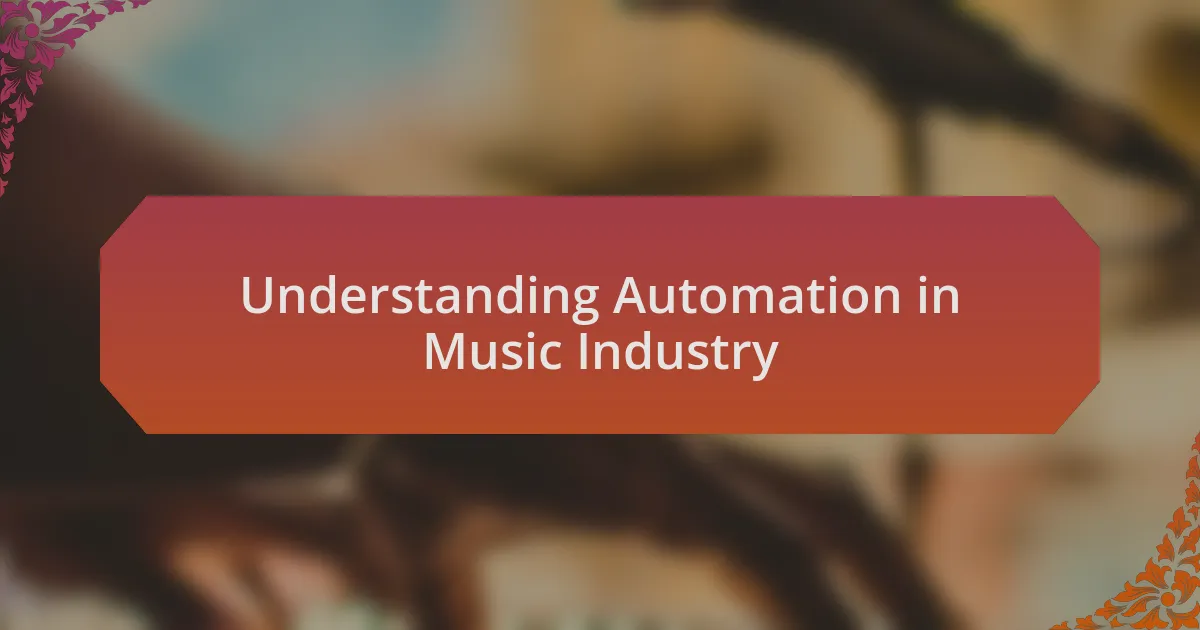
Understanding Automation in Music Industry
As I explore the unfolding role of automation in the music industry, it hits me how transformative it can be for independent record labels. For instance, automation tools can handle tasks like distribution and royalty tracking, allowing artists to focus more on their craft. Can you imagine how much more creativity could flourish if artists spent less time on administrative details?
In my experience, using automation for marketing has been a game-changer. I recall setting up automated email campaigns that brought thousands of new listeners to our label. It was incredible to watch as engaged fans responded to personalized messages while we could concentrate on discovering the next big talent. Isn’t it fascinating how technology can bridge connections between artists and their audience in such a seamless way?
The challenge, of course, is to find the right balance. I often wonder, can we rely too heavily on automation? While it streamlines processes, it’s crucial not to lose that personal touch that connects fans with art on an emotional level. There’s a delicate dance between efficiency and authenticity, but with careful consideration, automation can certainly enhance the music experience without overshadowing its heart.
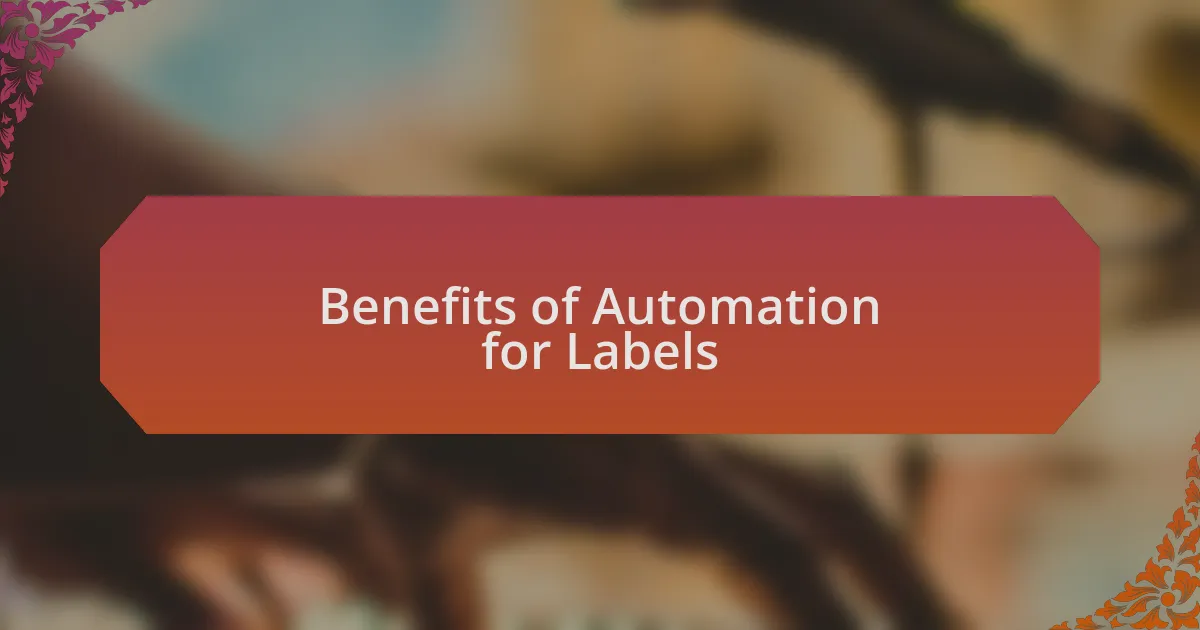
Benefits of Automation for Labels
Automation brings immense benefits to independent record labels, particularly in streamlining everyday tasks. The first time I witnessed this was when we integrated an inventory management system. Suddenly, I didn’t have to manually track physical merchandise sales. This not only saved hours each week but also reduced errors, allowing us to focus on fostering talent and developing creative marketing strategies. Isn’t it liberating to see how technology can simplify even the most tedious parts of running a label?
Another valuable advantage of automation is the ability to analyze data effectively. I remember diving into analytics after implementing a robust system that tracked listener demographics and engagement patterns. The insights were eye-opening! By understanding who our audience was, we were able to target our marketing efforts better, resulting in increased ticket sales for shows and more vinyl records sold. It really makes you think—how many labels thrive on guesswork rather than actionable insights?
Moreover, the scalability that automation offers cannot be overstated. When we expanded our roster, automation ensured that our processes could handle the increased workload. Tasks like scheduling social media posts and managing contracts became so much easier. I often reflect on how daunting it used to feel when we took on new artists, but automation transformed that anxiety into excitement. Isn’t it reassuring to know that with the right tools, growth can feel more like an adventure than a challenge?
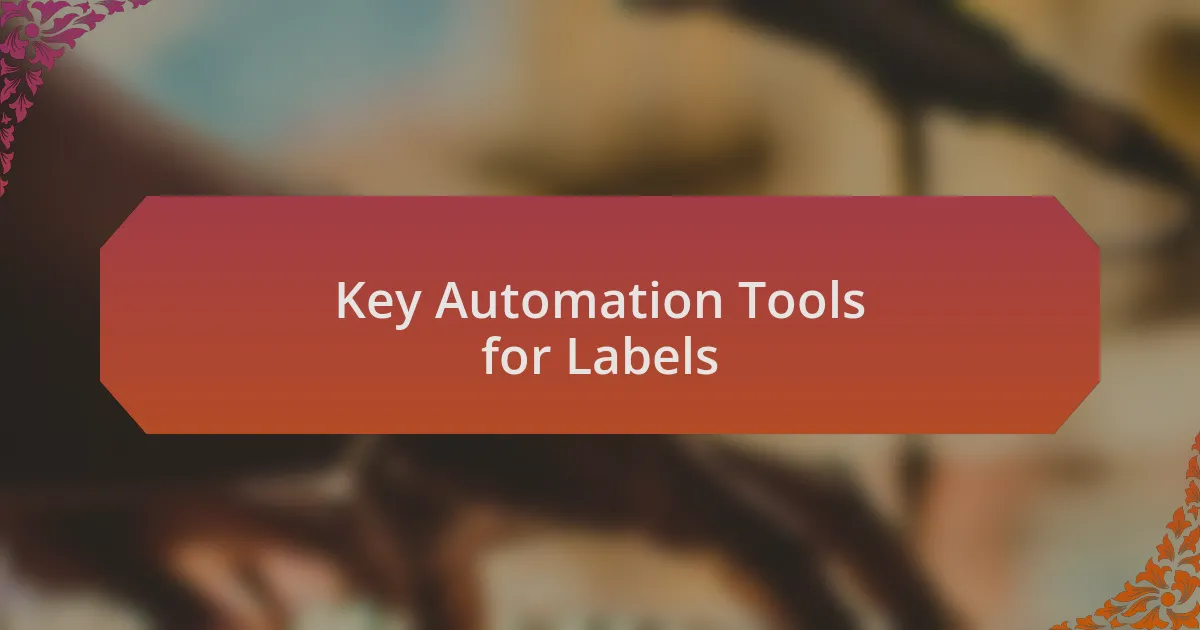
Key Automation Tools for Labels
When it comes to automation tools for independent labels, CRM (Customer Relationship Management) systems are game-changers. I remember the first time we implemented one; suddenly, all our artist and client interactions were centralized. This meant no more misplaced emails or forgotten follow-ups. Don’t you hate when that happens? With a solid CRM in place, I felt a peace of mind knowing that every relationship was nurtured seamlessly.
Another essential tool I can’t overlook is the use of email marketing automation. In my experience, crafting the perfect newsletter used to take hours, but automation changed the game. Now, I can set up drip campaigns that reach our audience at the right moments with the right messages. It’s like having an efficient assistant who knows exactly when to reach out and what our fans want to hear. Have you ever wished you could keep your listeners engaged without being glued to your computer? This tool makes that dream a reality.
Analytics platforms also deserve a mention. The moment we started using advanced analytics, I felt empowered to make decisions based on real data instead of intuition. I recall dissecting our streaming metrics for a recent release and discovering that certain tracks resonated deeply with specific demographics. It was exhilarating to realize we could tailor our future projects with that knowledge. Isn’t it exciting to think that automation can not only elevate your operations but also inform your creative direction?
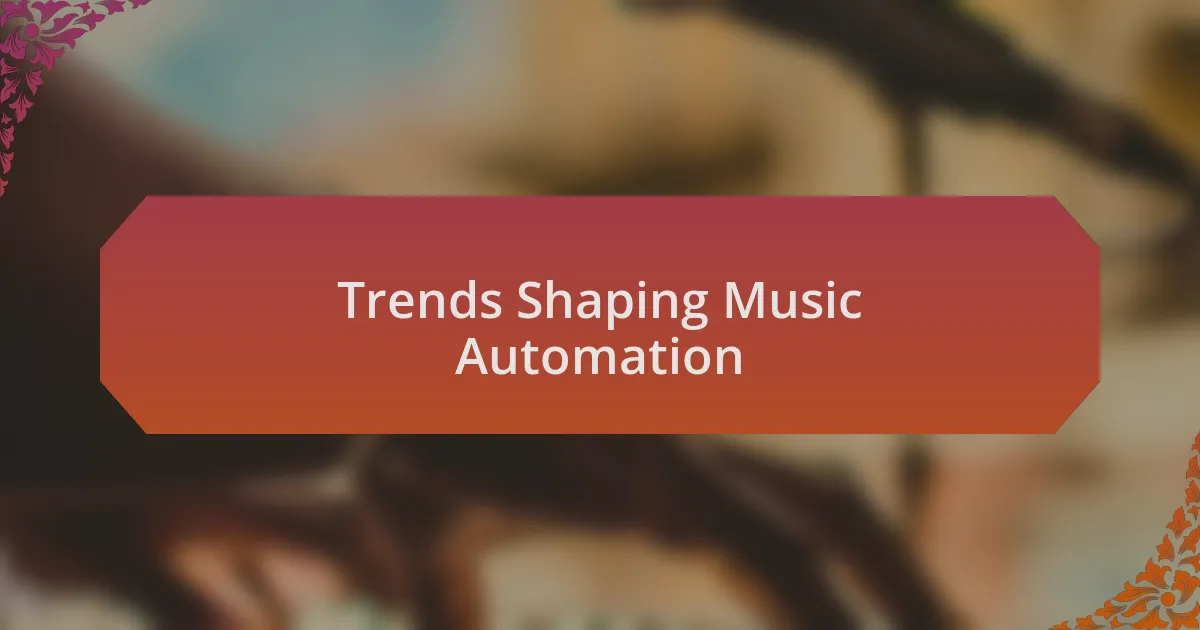
Trends Shaping Music Automation
One significant trend reshaping music automation is the rise of AI-driven tools that enhance music discovery. I still vividly remember the first time an AI recommendation leaned me toward a track I would have never found on my own. It was like discovering a hidden gem, and I realized this technology doesn’t just connect fans to music; it creates a personalized journey that keeps listeners engaged. How amazing would it be if every fan could experience that tailored discovery?
Additionally, automated content creation tools are now surfacing, helping independent labels streamline their social media presence. I recently experimented with AI-generated visuals for our campaigns, and the results were astonishing. It was fascinating to see how these tools could create eye-catching graphics in a fraction of the time I used to spend designing them myself. Don’t you think that every second saved can empower creativity and innovation in other areas?
Moreover, collaborations facilitated by automation are on the rise, allowing artists to work together across great distances. I remember collaborating on a project with an artist halfway across the globe, and I was amazed at how seamlessly we shared files and brainstormed ideas in real-time. The efficiency of automated project management tools made it feel like we were in the same room, fostering creativity in ways I never thought possible. Isn’t it inspiring to consider how technology can bridge gaps and create new partnerships in the music industry?
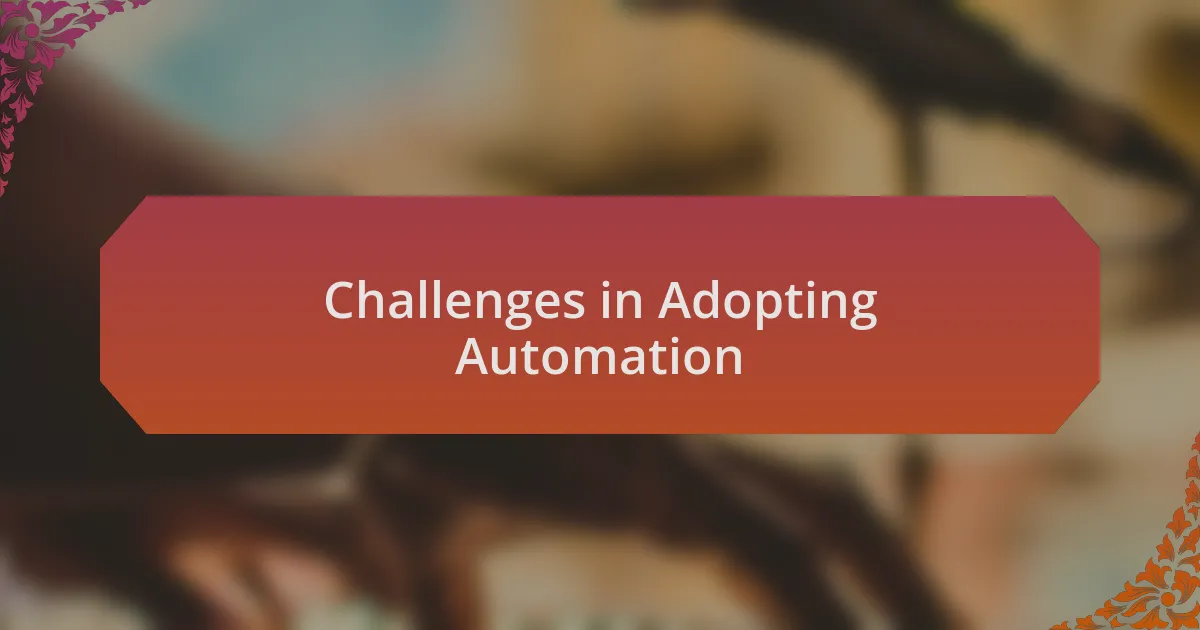
Challenges in Adopting Automation
Adopting automation in the music industry can present significant hurdles. I recall a time when our label hesitated to implement an automated distribution system because of concerns about losing the human touch in our communication with artists. It’s natural to wonder: how can we maintain our personal relationships in a tech-driven world? I believe that finding the right balance between automation and personalization is crucial for a successful transition.
There’s also the challenge of integrating new tools with existing workflows. I experienced this firsthand when we tried to merge our old data management systems with a new AI-driven platform. It was challenging, to say the least. I found myself asking whether the potential benefits truly outweighed the complications of integration. These moments of friction can be discouraging, yet they often reveal opportunities for growth and improvement.
Budget constraints can be another daunting barrier to embracing automation. I’ve talked to countless independent labels that worry about the initial costs associated with new technologies. It makes you think: is it worth the investment if the return isn’t immediate? While it’s crucial to weigh expenses against benefits, I believe that, in the long run, embracing automation can lead to more sustainable growth if approached thoughtfully.
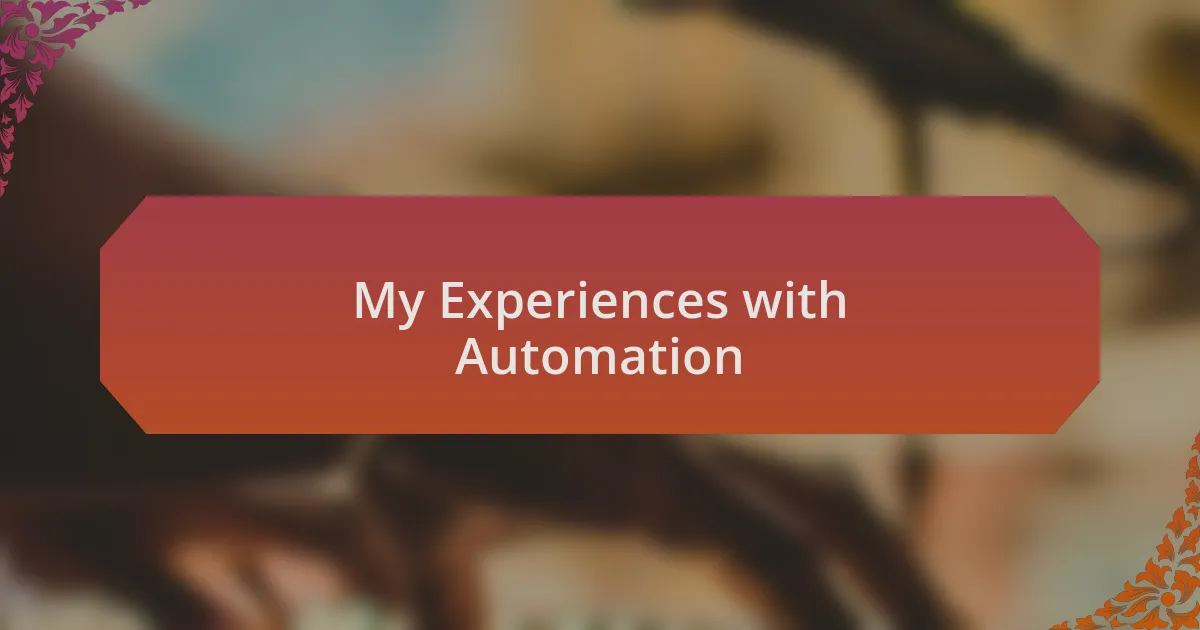
My Experiences with Automation
When I first delved into automation tools, I was struck by their potential to save time and streamline processes. I vividly remember the first time we implemented an automated email campaign for our artists. Watching the responses pour in while knowing I hadn’t typed a single message felt surreal, but it raised a question in my mind: could we rely on machines for something so personal as artist communication?
One day, while analyzing the data generated by our automated marketing efforts, it hit me—automation wasn’t just helping us; it was revealing insights we hadn’t considered before. I found myself reflecting on how these data-driven decisions could enhance our label’s strategies. Have you ever stumbled upon an unexpected result that changed your perspective? I certainly did, and it reminded me that automation can sometimes uncover hidden opportunities nestled within the numbers.
However, there were times when the reliance on automation left me feeling disconnected from the very essence of music-making. I recall a moment during a release when I automated social media posts, convinced it would engage our audience. Yet, what I realized was that nothing compared to the genuine connection formed through authentic interaction. This experience led me to explore how to merge my love for personal touch with the efficiency of automation—an ongoing journey that many in the industry might find relatable.